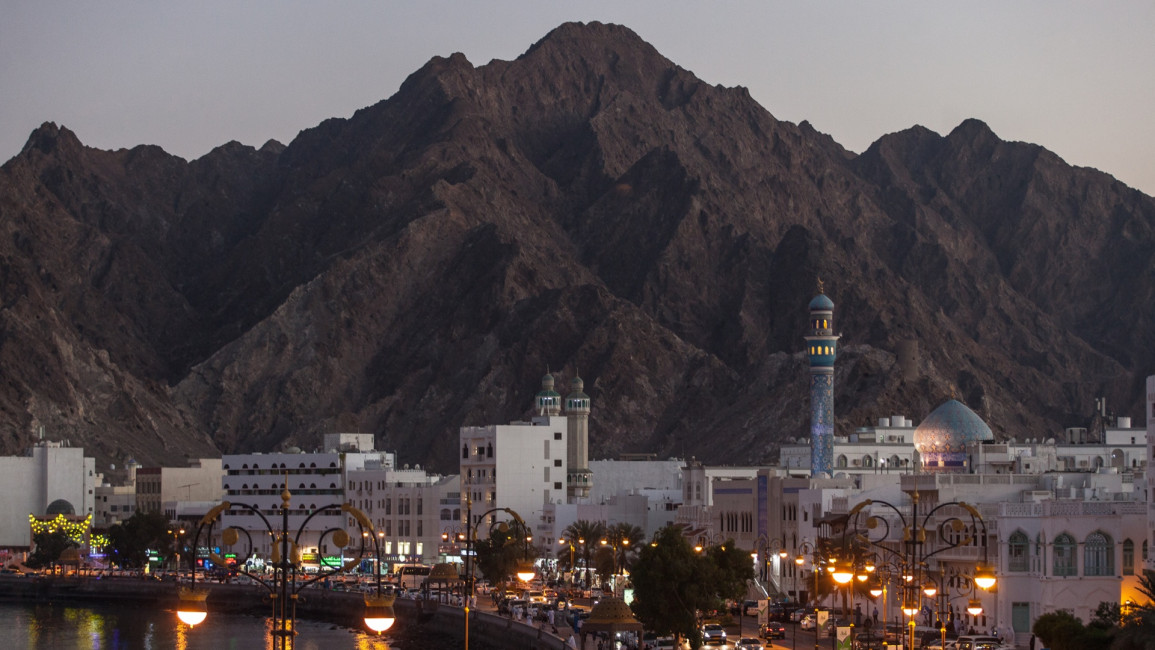Oman considers financial help from Gulf neighbours as coronavirus pandemic sinks economy
Oman considers financial help from Gulf neighbours as coronavirus pandemic sinks economy
Officials in the region revealed that financial aid for Oman was discussed at a 'recent high-level political meeting' between officials from Gulf countries.
2 min read
Oman is considering taking financial help from other Gulf countries [Sebastian Castelier]
Oman has held discussions with its Gulf neighbours about the possibility of receiving financial aid as low oil prices and coronavirus lockdown measures hit the sultanate's finances.
Two officials in the region told Bloomberg that financial aid was one of several topics discussed at a "recent high-level political meeting" between officials from Gulf countries.
The talks, which reportedly took place at the leadership and foreign ministry level, remain preliminary.
Two officials in the region told Bloomberg that financial aid was one of several topics discussed at a "recent high-level political meeting" between officials from Gulf countries.
The talks, which reportedly took place at the leadership and foreign ministry level, remain preliminary.
Oman has been experiencing economic difficulties since before the coronavirus crisis and is considered the most vulnerable economy in the Gulf Cooperation Council (GCC), Bloomberg reported.
A US official told Bloomberg that the other Gulf nations have reognised Oman's financial difficulties and are unanimous in their desire to help.
The US is also exploring ways it can help, the official said.
Oman's new Sultan Haitham bin Tariq was sworn in shortly after former Sultan Qaboos, the longest-serving leader in the modern Arab world, died in January.
As part of his pledge to make fiscal stability a priority, the Omani government has been looking to shear costs.
As part of these reforms, new Omani civil servants were told in May they would see significant salary cuts .
Ten of thousands of Omanis are employed by the state but the government is looking to ease public spending by increasing the size of the private sector and encouraging more Omanis to start their own companies.
Oman's economy has been hit by years of low oil prices and more recently by the coronavirus crisis, which has had a devastating impact on local businesses.
The sultanate's GDP growth is expected to shrink this year, with the government announcing a range of budget cuts to cope with the decrease in finances.
The state will force public workers with more than 30 years service to retire and half the salaries for board members of government organisations.
A US official told Bloomberg that the other Gulf nations have reognised Oman's financial difficulties and are unanimous in their desire to help.
The US is also exploring ways it can help, the official said.
Oman's new Sultan Haitham bin Tariq was sworn in shortly after former Sultan Qaboos, the longest-serving leader in the modern Arab world, died in January.
|
As part of these reforms, new Omani civil servants were told in May they would see significant salary cuts .
Ten of thousands of Omanis are employed by the state but the government is looking to ease public spending by increasing the size of the private sector and encouraging more Omanis to start their own companies.
Oman's economy has been hit by years of low oil prices and more recently by the coronavirus crisis, which has had a devastating impact on local businesses.
The sultanate's GDP growth is expected to shrink this year, with the government announcing a range of budget cuts to cope with the decrease in finances.
The state will force public workers with more than 30 years service to retire and half the salaries for board members of government organisations.
Oman has ordered state-owned companies to accelerate the process of replacing foreign staff with Omani nationals, especially in senior positions, to create more jobs for its citizens.
Read more: Oman prepares to overhaul its hotel sector for a post-coronavirus world
The finance ministry gave public sector companies until July 2021 to draw up timetables to appoint Omanis in the place of foreign staff, including in managerial positions.
The ministry said large numbers of expatriates still occupied managerial posts in state-run firms.
Foreigners make up more than 40 percent of Oman's population of 4.6 million, and have played a major role in the Gulf state's development for several decades.
Agencies contributed to this report.
Follow us on Facebook, Twitter and Instagram to stay connected


![President Pezeshkian has denounced Israel's attacks on Lebanon [Getty]](/sites/default/files/styles/image_684x385/public/2173482924.jpeg?h=a5f2f23a&itok=q3evVtko)



 Follow the Middle East's top stories in English at The New Arab on Google News
Follow the Middle East's top stories in English at The New Arab on Google News


